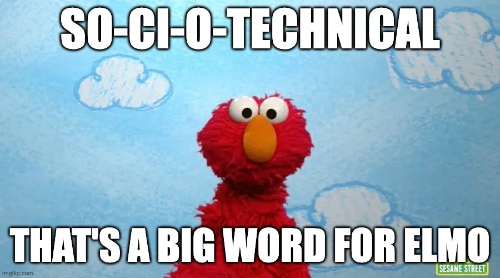
June 16, 2025

I have a sneaking suspicion that when people in tech talk about socio-technical systems, most of the time it’s just fancy-talk for “people are important” or possibly something-something Conway’s law.
We don’t seem to be doing much with the insight that software is socio-technical except stating it as sort of a profound fact. What does it mean and what are the implications? How does it change how we do things?
Socio-technical systems are interesting because they are complex. But I see little to no discussion of the impact of the characteristics of such systems (interconnectedness, adaptivity, non-linearity, emergence) in software organizations. At best we pass around a single Ackhoff quote (always the same one): “a system is not the sum of its parts but the product of its interactions”. Good. Nice quote. But surely that can’t be the end of it.
If it is interesting and worthwhile to consider software organizations as socio-technical systems, surely it is because we want to explore the properties of such systems, and ultimately to apply what we learn? If instead we proceed to throw it aside and treat software organizations as linear, applying mechanistic and reductionist ideas, we are bullshitting ourselves and we should restrict ourselves to smaller words. It’s a good heuristic to use the smallest words we can to make our point.
If we mean nothing more than the truism that “people are important”, we can just say that. And if Mel Conway managed to discuss the homomorphism between the design group and the system without invoking the word “socio-technical” (with the above-mentioned implications for system properties), I’m sure we can too. If we want to discuss Conway’s law in the light of socio-technical systems, it must be because the properties of such systems are somehow relevant to the discussion.